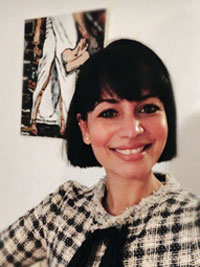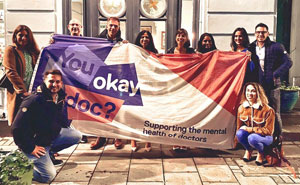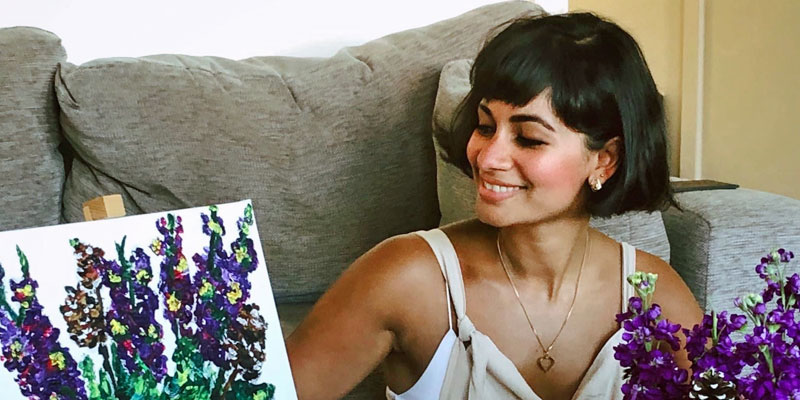Dr Katrina Sheikh is an acute medical doctor in London and final-year registrar. Katrina’s specialist interest is leadership and management and is hoping to become a consultant next year. She is also a founding ambassador of the mental health charity, You Okay, Doc?.

“I think it’s important to have diverse thinking because in medicine nothing is straightforward. Even if you’ve got guidelines, they’re guidelines. One size doesn’t fit all.”
Entering medicine at postgraduate level
I’m from Solihull, in the West Midlands, but I did my undergraduate degree at King’s College London in biomedical sciences having missed my chemistry grade by a mark. I then studied postgraduate medicine at Warwick University. Ultimately this was the best route for me and I am very open and honest about my journey into medicine.
Currently, I am a senior registrar working in London and hoping to become a consultant next year.
In acute medicine, you specialise in a skill which can be anything you want, like ultrasound, medical education, for example. I chose leadership and management having experienced undermining and a poor culture at work. I applied to become a Chief Registrar, which is a flagship leadership programme with the Royal College of Physicians (RCP). I also completed a postgraduate certificate in Leadership for Health Professionals last year where I was awarded a distinction.
I am continuing to pursue my specialist interest in leadership and management and will be co-chairing podcasts for You Okay, Doc? and have been asked to be a panel member for the Faculty of Medical leadership trainees steering group.
Patient care is paramount
Acute internal medicine (AIM) provides the initial assessment, investigation, diagnosis and management of patients who have an acute medical illness within the first 72 hours of their hospital stay. This usually takes place on an AMU (Acute Medical Unit), but some patients can be cared for in ambulatory care which allows patients to be discharged the same day.
What I love about acute medicine is the variety of patients I see from all specialities. I love treating the acutely unwell patient and interacting with other specialities in the hospital. Acute medicine also allows a lot of procedures to be done such as lumbar punctures, chest drains and ascitic drains. I love treating patients effectively and efficiently and seeing patients get the right care at the right time.
When COVID-19 hit
We were all put on an emergency COVID-19 rota in 2020. I will never forget my first night shift on that COVID rota. A 22-year-old came into Resus, struggling to breathe, shortly after he had a cardiac arrest and very sadly died. I couldn’t believe it. That was only two hours into my night shift and then we saw a following 35 patients with COVID that night.
Our rota was three days on, three days off. And the shifts were long hours, 12 to 13 hours. This meant I had to stay in a hotel during my working days, even though I lived with my partner at the time. Every three days I would come home, and then pack my suitcase again and keep on going. I didn’t know what day it was.
It was all very stressful, there was a lot of emotion, and it obviously affected my mental and physical health. It was a very traumatic time, not only for the patients but for the staff. My relationship broke down, I wasn’t looking after my own health. I usually exercise and do HIIT three times a week. Everything had gone out of the window.
COVID-19 poses lots of new and ongoing challenges for the healthcare system. Compassionate leadership aims to arrive at a shared, rather than imposed understanding of the challenges that we are facing in this global pandemic. We must empathise with healthcare workers whilst take action to help and support them.
You Okay, Doc?

I frequently question “How can doctors be expected to look after patients if they don’t look after themselves?” It is imperative we all look after one another, we must maintain our own physical and mental health so that we can give the best care to our patients.
I want to support other doctors during their training, develop a collaborative and compassionate leadership and have recently become a Speak Up Champion for my hospital Trust so that I can be a voice for my colleagues in raising concerns.

It’s really nice to be part of a community of like-minded individuals who all want the best for each other and want to look after each other’s mental health. I became a doctor because I care for my patients and my colleagues. Simple as that
Digital health as a driver of efficiency
I am going to be honest and admit I have a Filofax! I am very old-fashioned in that respect which people do laugh at. I cannot go anywhere without it. However, my ex-partner, an ENT [Ear, Nose and Throat] surgeon who started his own digital health company, got me interested in various platforms that can help patients get the right care, first time by using technology.
There’s always a gap between primary and secondary care and there really shouldn’t be, we should all be working together. Part of it is due to poor technology and communication.
I played a part in creating a virtual ward for COVID patients with my team so not all COVID patients had to be admitted to hospital, but we could still look after them. This is how it worked: we would discharge them with a SATs probe, and we would ring them up every day to ask them how they’re feeling. They would record all their oxygen levels, and we would assess if they needed to come in for more treatment or if they were okay to stay at home. We managed to publish our work which showed we made a difference.
I do believe digital health is key and must play a part. I believe in choices and flexibility. Some patients have a general fear of hospitals and don’t want to spend money on a taxi or the bus fare, so we should be able to adapt to them and have video/telephone calls for example, especially for routine appointments. On the other hand, some patients love seeing doctors face to face and it gets elderly patients out the house. I believe there should be a mixture, a choice.
I am keen to learn more about innovation and how I can apply it to the acute medical setting. I went to a lot of events, and I met a lot of doctors who have a keen interest in improving patient care and making things more efficient in the NHS so it is something I am definitely keen to pursue. I like advocating for companies that genuinely want to make a difference to patient care and safety.
One size doesn’t fit all
Medicine is very diverse. This includes patients themselves, medical conditions, styles of medicine used, and different leadership styles: that’s why I love working as a doctor. Every day is different for me.
There’s compassionate and caring leadership, which is what I like to follow. You’ve got inclusive leadership, where you include everybody. There is dispersed leadership where everyone is a leader and of course you have narcissistic leadership where some people can lead their organisation into destruction and then the department develops a toxic culture.
I think it’s important to understand different styles of leadership, because they all have their pros and cons. It’s important to have diverse thinking because in medicine, nothing is straightforward. Even if you’ve got guidelines, they’re guidelines. One size doesn’t fit all. That particular guideline might not fit one patient because they’re allergic to that antibiotic for example or they just don’t want that particular treatment.
I believe in inclusivity. I was brought up from a mixed-race background. My mum is Polish and Ukrainian, and my late father was Pakistani, so they had different religions when they met and brought me up to be very open-minded.
Showing emotion to patients
Doctors are human and sometimes this is easy to forget. We have feelings and sometimes patients and their stories can trigger things we are suffering ourselves. For example, when I treat a patient with cancer, it does bring back memories of my father. He was a psychiatrist who also treated doctors with mental health conditions. It is normal and this is why I am keen to support doctor’s mental health and talk openly and be honest about what we are struggling with.
I’ve been through tough things in my life, and I have chosen to share some experiences with patients and I think this was key in their treatment. They trusted me and respected me more and we developed a better rapport with each other.
The same goes for my colleagues. I never want anyone to be scared to come up to me and ask for help. I think if people are valued at work and treated with respect, people will want to progress in their careers. And if not, people will walk away. Happy staff equals happy and safe patients.
Coming up next
I like to take each day as it comes. I’m just grateful to be here each day doing a job I love, and I know that sounds very morbid, but when you’ve been through personal loss and have seen a lot of people die from COVID and of course other conditions, you will understand that.
I want to pursue things outside of my job. For instance, I’m very close to the Royal College of Physicians and are very supported by them, so I would love to work with them more. I would also like to do more things with ‘You Okay, Doc?’ and continue to exercise and paint more!
I’ll see where life takes me but at the moment I am enjoying my final year as a registrar!
https://www.linkedin.com/in/dr-katrina-sheikh-frsa-%F0%9F%92%99-94b60922/
https://www.katrinasheikh.com/
https://twitter.com/katrinasheikh





